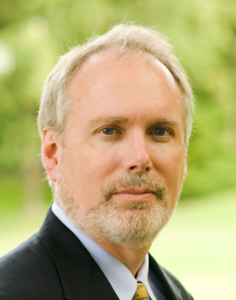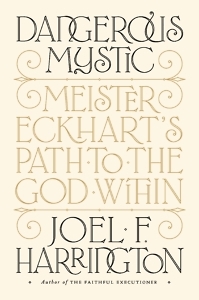A Mystic for Our Time
Joel Harrington considers the medieval life of New Age favorite, Meister Eckhart
Like Rumi and Gautama Buddha, Dominican theologian Meister Eckhart (1260-1328) is a spiritual philosopher whose words and ideas have wandered far from their source. His teachings have been taken up, secularized, and recycled by New Age gurus and self-help writers such as Eckhart Tolle, whose bestselling book, The Power of Now, has been read by millions. But while Meister Eckhart’s ideas are widely known, their original context is not. Vanderbilt historian Joel Harrington sets out to fill that vacancy with Dangerous Mystic, an examination of the religious, cultural, and political atmosphere in which Eckhart’s teachings developed, flourished, and were ultimately condemned.
 Eckhart was born in the state of Thuringia in central Germany, the son of a knight. He had an aristocratic upbringing but chose to join the Dominicans, a mendicant order that emphasized preaching, when he was still a teenager. This decision amounted to a repudiation of his family’s status, as well as a rejection of what Harrington calls the “new money mentality” that had taken hold in Europe as population growth fueled commerce. Young Eckhart’s choice can be seen as part of a wider cultural backlash against the consumer economy and in favor of a more spiritual approach to living. The Dominican order itself was founded out of the Church’s desire to serve this spiritual hunger after the growing influence of lay movements threatened to undermine clerical authority.
Eckhart was born in the state of Thuringia in central Germany, the son of a knight. He had an aristocratic upbringing but chose to join the Dominicans, a mendicant order that emphasized preaching, when he was still a teenager. This decision amounted to a repudiation of his family’s status, as well as a rejection of what Harrington calls the “new money mentality” that had taken hold in Europe as population growth fueled commerce. Young Eckhart’s choice can be seen as part of a wider cultural backlash against the consumer economy and in favor of a more spiritual approach to living. The Dominican order itself was founded out of the Church’s desire to serve this spiritual hunger after the growing influence of lay movements threatened to undermine clerical authority.
As a Dominican friar, Eckhart initially devoted himself to scholarship. (“Meister” is a scholarly honorific, like “Doctor” or “Professor.”) His early sermons, aimed at his brothers in the order, are noteworthy for their gentleness and speak against penitence and suffering as the path to holiness. In Harrington’s words, Eckhart believed God “fervently wants to forgive, not to punish.” Though this notion pushed back against a common cultural attitude of the time, it was not particularly controversial or dangerous.
It was not until his early fifties, when he was already established as a respected theologian and administrator, that Eckhart turned his energies to lay audiences and began making the kind of statements that would ultimately get him into trouble. While he promoted the idea that God was unknowable to the rational mind (“If you can think of anything He might be, He is not that”), he also preached that human union with God was not only possible but available to anyone, regardless of status or education.
 As Harrington explains, this notion did not, strictly speaking, violate official doctrine, but some of the ways Eckhart chose to express it were shocking to his contemporaries. Statements like “Whatever holy scripture says of Christ, all that is also very true of every good and divine man” led to charges of heresy, and finally to a papal condemnation delivered more than a year after Eckhart’s death.
As Harrington explains, this notion did not, strictly speaking, violate official doctrine, but some of the ways Eckhart chose to express it were shocking to his contemporaries. Statements like “Whatever holy scripture says of Christ, all that is also very true of every good and divine man” led to charges of heresy, and finally to a papal condemnation delivered more than a year after Eckhart’s death.
Dangerous Mystic goes fairly deeply into Eckhart’s surviving sermons to convey the subtler aspects of his ideas about divine union, as well as a concept Harrington translates as “letting-go-ness,” or the total surrender of self. Anyone wanting a readable primer on Eckhart’s ideas will find it here.
But the real strength of the book lies in the way Harrington delivers a sense of the medieval world Eckhart inhabited. The Paris of his student years is “the largest metropolis in Christendom,” where “the pervasive stench of excrement and other refuse” fills the air and poorer scholars find lodging in taverns and bordellos. Harrington writes at fascinating length about the beguines—lay religious women who followed their vocation outside church authority, and who indirectly played a part in Eckhart’s downfall. He sketches an unusually nuanced picture of the Church’s role in the life of ordinary people during the Middle Ages.
Though few details are known about Meister Eckhart’s life beyond what can be gleaned from the facts of his clerical career, Harrington’s narrative conveys a real sense of his brilliance and humanity. Through ample short quotations from the sermons and Harrington’s rich historical context, we hear Eckhart’s compelling voice, timeless in its wisdom, speaking from a very specific time and place.

Maria Browning is a fifth-generation Tennessean who grew up in Erin and Nashville. Her work has appeared in Guernica, Literary Hub, and Still. She is the managing editor of Chapter 16.


